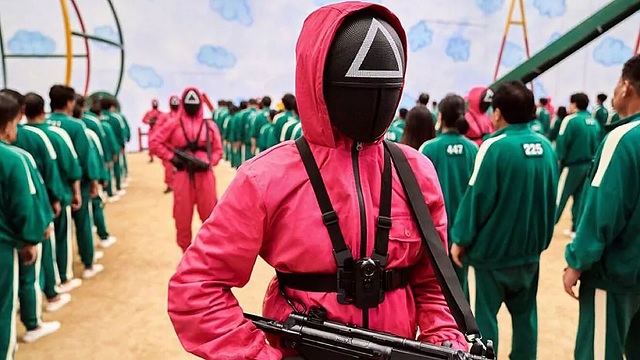
Seoul, South Korea | Xinhua | A South Korean drama “Squid Game” has drawn worldwide attention as it vividly depicts the cruelty of capitalistic society through children’s games played by a group of debt-ridden underdogs for money.
The dystopian drama, which debuted on Netflix on Sept. 17, attracted over 111 million views in less than four weeks, becoming the streaming service’s most-watched series.
Created by South Korean director Hwang Dong-hyuk, “Squid Game” tells the story of 456 people in various types of financial stress who enter a survival tournament, composed of children’s games, in hopes of winning a cash prize of 45.6 billion won (38.7 million U.S. dollars).
The capitalistic cruelty is exposed at the beginning of the series. In the first episode, participants are gunned down in the red light, green light game when an eerie schoolgirl doll finds them moving, indicating that falling behind in the competition of capitalistic society leads to a survival contest.
In the second episode, the survivors from the first game decide by vote to leave the competition, but they voluntarily and inevitably return to risk their lives for the money as their reality is no better than the life-and-death sick game.
“Squid Game” overcame cultural and language barriers to achieve a worldwide success as it tells the story of ill-fated people, with whom the global audience can empathize and sympathize.
“Since the (COVID-19) pandemic breakout, wealth disparity widened in the world amid the rising number of people who suffer from economic hardships. Even vaccines cannot be supplied properly to poor countries,” director Hwang said in an interview with local broadcaster JTBC.
“Characters in ‘Squid Game’ are closely akin to people in the real world, so (global viewers) seem to empathize with the characters. Because the same thing is happening around the world, (the series) seem to win worldwide empathy,” said the director.
The story is told mainly through the perspective of Seong Gi-hun who was fired from an automaker after protesting against the corporate restructuring. He is harassed and beaten by moneylenders but still gambles to pay back debt. He has a sick mother and does not have even money to buy a birthday gift for his daughter living with his divorced wife.
In the competition, Seong encounters his childhood friend Cho Sang-woo, who was an elite working for a securities company after graduating from a prestigious university but is now wanted by the police for the embezzlement of millions of dollars after failure in speculative investment in stock futures.
The participants, including Seong and Cho, form alliances to survive but are eventually forced to betray even friends in the sixth episode, titled “Gganbu,” a South Korean slang used by the older generation that means a close friend with whom you can share everything.
In the sixth episode, Seong and Cho select their respective Gganbu to pair up with before starting the game of marbles. They belatedly realize that they chose opponents rather than teammates and they can save themselves with the death of their Gganbu.
Seong survives by deceiving an elderly man, who was aware of the deception but willingly lost the game because he regarded Seong as Gganbu, while Cho betrays a naive Pakistani immigrant laborer who trusted him to the end in gratitude for Cho’s provision of money for bus.
As the game goes on, the contestants increasingly lose humanity, and the dehumanization peaks when “VIPs” arrive at the game site and start betting on which one would die next.
“I’d like to ask questions once in a while about why we were driven into this hyper-competitive society and who laid down the rules of the game. Those are questions about politics and also about the system,” said the director.
“Questions should continue to be asked about why the society works like it. When we live as if we’re being chased, we may die as pieces on a (Korean) chessboard,” he noted.
The VIP appearance raise suspicions among the audience that they may be one of pieces on the chessboard of the real world like the participants in “Squid Game,” where underdogs are pitted against each other to survive as a tiny number of rich people orchestrated it to toy with poor people’s lives for fun.
The elderly man, who lost the game of marbles to Seong, turns out to be an apex predator in the social strata as the elderly does not need to die for defeat in the game, designed and operated by himself, due to his possession of wealth.
The game contestants, who represent the have-nots, have no individuality as seen in costumes. They wear the same green track suits and are addressed as numbers without names, indicating their insignificance and replaceability.
The guards, who represent collaborators for the rich, wear the same pink jumpsuits with guns, but their faces are covered with masks. The Front Man, the leader of the guards, wears a more distinctive mask, donning a hoody with matching trousers and leather gloves.
The VIPs, played by white Western actors, wear different types of dazzling animal masks to show individuality clearly, while the apex predator enjoys a complete freedom from what to wear as he is dressed in green track suits to join the game.
A South Korean movie critic was quoted by a local media as saying that “Squid Game” blatantly reveals the violence of the times as seen in characters who voluntarily became the pieces of the chessboard in thrall to capital.
*****
Xinhua
 The Independent Uganda: You get the Truth we Pay the Price
The Independent Uganda: You get the Truth we Pay the Price


